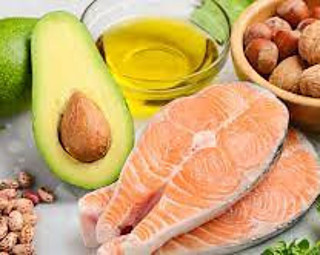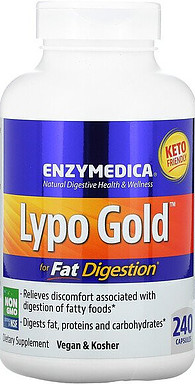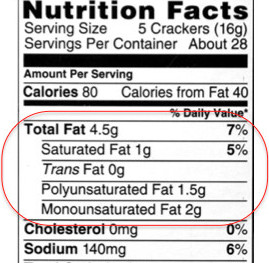Dietary fat is one of the three macronutrients along with carbohydrates and protein that the body needs in large amount. There are studies indicate that good dietary fats can be very beneficial for autistic brains. The question becomes how autistic people can better advantage the benefits of fats.
What are benefits of fats
Fat can be confusing concept if it is not understood properly. Dietary fats are often cautiously used in diets for people with autism as obesity becomes another concern of autism health. The truth is that the proper dietary fats are not only very important for the body, especially for the brain health, but also can help manage obesity when consumed properly.
- Dietary fats are broken down to fatty acids by digestive enzymes and bile released from liver in the body. Omega-3 and omega-6 are two essential fatty acids that body can not create without the intake from dietary fat.
- Fatty acids are used for energy and different functions from supporting cell growth, healing wound to producing hormones. The liver stores the extra fatty acids as fat for later use.
- Body fat not only can protect organ, keep the body warm but also can be broken down for energy and other biological processes when needed.
- Fatty acids are essential to vitamins A, D, E, and K since they are only soluble in fats. They carry, absorb and store these vitamins for much-needed body functions.
- Typical brain consists around 60 percent of fats and Omega 3-fatty acids are the essential building blocks of the fats for the brain.
- Fats are harder to digest in the body that lasts longer for the body to feel full.
What are Different Types of Fats
There are 3 different types of fats in food that include saturated fats, unsaturated fats and trans fats.
Saturated Fats
A saturated fat is a type of fat that is solid in room temperature. Its fatty acid chains only have single bonds between the carbon atoms. Single bonded carbons atoms are “saturated” with H atoms that have no double bonds available to react with more hydrogen (H).
- Saturated fats play important roles for the body although it can be produced by the body itself. More than 50% of the cell membranes are made of saturated fatty acids which make the cell firm and stable. They are also much-needed for bone and liver health.
- The antimicrobial properties from saturated fats can protect the digestive tract from harmful microorganisms. It boosts the immune system.
- When consumed in excess, saturated fats can add a factor for weight gain since they are dense in calories.
- Saturated fats remain as one of the most controversial topics for the modern health. More research and evidences are needed to prove that they might be risk factors for heart disease and related conditions.
Unsaturated Fats
An unsaturated fat is a type of fat that the fatty acid chains have one or more double bonds between carbon atoms. The double bonds make the fat capable to react with hydrogen.
- Unsaturated fats mainly includes monounsaturated fats (MUFAs) and polyunsaturated fats(PUSAs). A monounsaturated fat has one double-bond between carbon atoms while a polyunsaturated fat has two or more double-bonds between carbon atoms.
- An unsaturated fat is a liquid at room temperature and commonly understood as healthy fats or the best type of fat. It is believed that it can provide health benefits in protecting heart health or easing inflammation besides it is needed in building the cells.
- Omega-3 and omega-6 fatty acids are two types of polyunsaturated fats that the body can’t make them by itself. They are important components of cell membranes that help regulate brain and heart health, and respond to inflammation.
- Body can make monounsaturated fats and other polyunsaturated fats from other macronutrients as needed.
Trans fats
Trans fats are known as bad fats as it is believed that they can cause numbers of health problems. Simply put, trans fats are formed when the double bonds of carbon atoms in unsaturated fats are connected with hydrogen chemically. The chemical structure of trans fats is harder to break down in the body by the enzymes than the ones of unsaturated fats or saturated fats.
Trans fats can be found in food that either are naturally grown or are artificially made.
Naturally-GrownTrans Fats
Natural trans fats are the fats naturally formed in the stomach of ruminant animals by the bacteria when digesting grass. It is a bio hydrogenation that modifies the unsaturated fats from grass to the trans fats. The following are the examples of natural trans fats in percentage of total fats:
0-2% in chicken and pork,
3-7% in full fat dairy products like milk and cheese,
3-10% in beef and lamb,
As we know that trans fats are structurally harder to be broken down in body, that is one of the reasons chicken is easier to be digested than beef with less trans fats.
The man-made trans fats are purposely produced by the artificial hydrogenation process. It reforms unsaturated liquid fats to solid fats that are similar to saturated fats with opposite positions of newly added hydrogen atoms.
They are considered to raised bad cholesterol LDL and lower good cholesterol HDL, therefore it increases the risk of heart diseases and related conditions.
Industrially made trans fats are banned in USA and other Eurasian Economic Union countries since 2018, which only allows 0.5gm/serving of trans fats to be indicated as 0 trans fat on the label. By end of 2021, total of 58 countries will ban the artificial trans fats.
How to Manage Dietary Fats
There are a few different ways of managing dietary fats to make the most benefits out of them. The best ones are:
Managing Dietary Fats by Amount
Remember these three words for quantity of abundant, moderate and little when managing the intake of dietary fats.
- Abundant- Go big with healthy fats especially omega-3 & omega-6, which can be attained from sources like fatty fish, walnuts, ground flax seeds or canola oil etc.
- Moderate- Fair amounts of saturated fat from red meat or dairy can still be beneficial for the body.
- Little- Try to stay away from the processed food or fried food with trans fats, especially with the products that are indicated 0 trans fat on the label but have partially hydrogenated oil in the ingredients.
Add Healthy Fats in Action
- Shop-Get used to shop different kinds of healthy oils. The list can go on from vegetable oil, olive oil, coconut oil, avocado oil, to sesame oil. Enjoy different flavors for different dishes with different oils.
- Cook- It may require new habits of cooking. Cook anything from fatty fish, different cut of animal meats to vegetables with generous healthy oil.
- Eat-From milk to eggs, full-fat ingredients can help eat more healthy fats.
- Snack- Nuts, seeds, fruits or dried fruits are among the best choices to snack on when needed.
Fat Supplements for Autism
Fat supplements can be the supplements that help address the issues in fat management. In autism care, we are more focus on the supplements that either help digest fats or increase fat intake for the body.
It can be very difficult to manage the diets with proper fats for autistic individuals. Although it is rare with allergy to fats, it is common that autistic individuals have issues related to fats. They can be digestive issues related to diseases or proper intake amount due to diet. This can be another reason to lead to the malnutrition for the body and brain. For the people with autism, healing brain is their core care to help them improve.
Some studies reported that high fat diets like the “Keto diet” has positive impact on improving autistic behaviors. The diet focuses on eating mostly plant-based unsaturated fats, although it is yet to approve that this kind of high fat diet is beneficial for the body in the long run.
Fat deficiency is less concern for healthy people who eat a balanced and nutritious diet. However, there are a few reasons that the autistic individuals might be recommended by health providers to intake some supplements related to fats.
- Natural deficiency from autism – Studies reveal the association between low levels of omega-3 fatty acids and increased risk for autism. It is very possible that omega-3 fats are the natural deficiency for the autistic people. Supplements like omega-3 fish oil might be recommended.There is a range of fish oil supplement can supply the extra need, in the forms of liquid, capsules or gummies.
- Insufficient Dietary Fat Intake – Currently, USDA recommends having up to 35% of total calories from fat. It means that average person can have up to 66 grams of fat per day on an average 2,000-colorie diet. An autistic person can use this guideline for the dietary fat intake. If they somehow can only consume the fat amount way below the guideline, fat supplements might be recommends for extra intake without other underlined health problems.
- Digestion Problem – Digestion problem can be caused by different illnesses or lipid metabolism disorders that are lack of digestive enzymes. It would be different approaches when the illnesses are the causes. However, if the problem is not caused by a disease, the health provider might recommend enzyme supplements for digesting fats and probiotic supplements for a healthy gut.
- Absorption problem – If gastrointestinal disorders or other diseases cause fat deficiency, a health provider may recommend oil MCT oil supplement for an easier absorption of fat.
Dietary fat management is a big part of autism diet and autism care. Although each autistic individual might need different approaches to best advantage healthy dietary fats, they are essential to help autistic people optimize their brain functions.
It is great if you can share your favorite fat supplements below.

